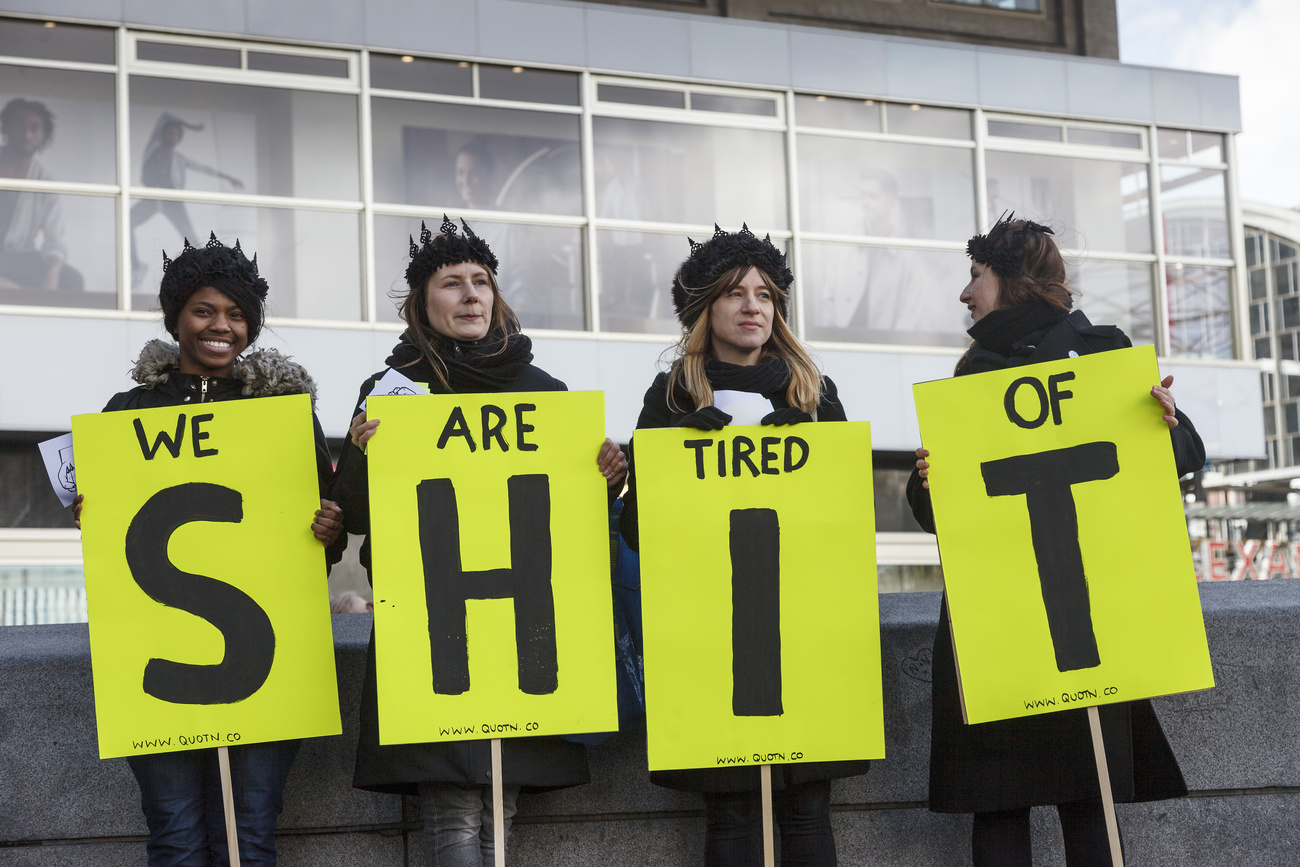
Are ‘dick pics’ porn, harassment or abuse? No one quite knows.

Online sexual harassment is a worldwide problem. In Switzerland, women can now quickly report cases of online abuse to the police via a new website. It is the beginning of a solution to a problem which is rarely addressed.
In Switzerland, almost half of all women aged 16-39 say they have been sent unsolicited messages of a sexual nature, according to a 2019 surveyExternal link. And one in five young women have received sexually explicit photos. The findings echo those of an earlier UN reportExternal link that showed that worldwide three-quarters of all women using the internet have faced some form of online violence or harassment.
Many women just ignore this harassment, as legal recourse would take too long, cost too much and involve humiliation, says Jolanda Spiess-Hegglin. She is the founder and head of #NetzCourage, a non-profit organisation. It aims to encourage women to set limits for offenders by enabling them to report unwanted penis photos, so-called “dick pics”, to police authorities in a matter of 60 seconds via a report tagged #NetzPigCock.
On www.netzpigcock.chExternal link victims can upload the offending photo. #NetzPigCock then generates a pdf document, which can be printed out and sent to the public prosecutor’s office in the canton. The data are only locally stored, points out Spiess-Hegglin. The former Zug politician has been awarded the Somazzi prize “for her pioneering work in favour of more respect and human dignity, and against hatred on the Internet, which is particularly directed against women”.
No law on online sexual abuse
When the website launched last March 1,178 reports were downloaded in the first month. It is unclear how many police investigations these have resulted in, as the reports go directly to the public prosecutor’s office.
The number of total reports of sexual harassment in Switzerland, including verbal abuse on the internet, is not available according to the Conference of Cantonal Police Chiefs.
“Sexual and sexualised violence are a big problem, and politicians can no longer sweep it under the rug,” says Spiess-Hegglin. Only rigorous prosecution will make the problem known and discourage would-be offenders, she adds.
In Switzerland, as in most other countries, there is no legislation dealing with sexual harassment in digital environments. For online abuse, the law goes back to the last century; it deals with analogue versions of such offences. Swiss legislation on sexual offences had its last revision 30 years ago.
In Switzerland, unwanted penis photos fall under the heading of pornography and not sexual harassment. Under Article. 197 Section 2 of the Swiss Criminal Code, there is a fine for those who “offer unsolicited” pornographic writings, audio or visual material, illustrations or other material of that kind. If the person receiving an unwanted penis photo is under 16 years of age, the legislation provides for a prison term of up to three years. But is the legislation sufficiently up to date?
Existing legislation lags behind the new reality. Much of what constitutes online harassment still falls in a grey area. Women have to prove they have been abused and that they opened the online post as soon as it was received for a picture of male genitals can be considered as sexual harassment. Netzcourage.ch describes this situation as archaic.

Nordic progress
There is need for reform involving the classification of these offences and what constitutes an offence, on many levels – and in many jurisdictions. A number of countries have amended their legislation on sex offences to help clarify the situation. In Finland, for example, parliament will debate a bill this year which imposes penalties of up to six months’ imprisonment for the unwanted sending of penis photos and other such explicit photos – even if they are sent to adults.
In Switzerland, an amendment to the legislation on sex offences is currently before parliament. Among the items under discussion is the legal article on sexual harassment.
Will dick pics be included under that heading? The matter will be not discussed by parliament before next autumn. Lawmakers are currently discussing what constitutes abuse and what proof the women have to come forward.
In its responseExternal link to the government consultation on the proposed amended legislation, #NetzCourage said it welcomed the fact that the definition of sexual harassment would be expanded to include photos; acts and utterances would be penalised, but also the electronic transmission of sexual images. At the same time, the group expressed disappointment at the “lost opportunity to adapt the offence of sexual harassment adequately to the reality of abuse on the Internet”. The law still requires the victim to prove she was the one who received the photo and saw it as soon as it landed on her phone.
Why do men send dick pics?
A change in sex crime legislation is also demanded by the German journalist Susanne Kaiser, author of a book on “political masculinity”. Prosecution of offences committed on the web is problematic given the pornography article, she told SWI swissinfo.ch. “If you treat harassment as just pornography, the power factor is not visible. Thus misogyny and sexism continue to be invisible – and therefore socially acceptable.” For Kaiser, dick pics are a matter of power and violence directed against others. “It would be fatal to regard them as something harmless.”
Among academics, a distinction has emerged between sexual and sexualised violence. The latter does not involve sexual desire; in these cases sexuality is used only to humiliate the other person and demonstrate power and superiority. These offences can range from sexual talk to invitations to engage in sexual acts.
Senders of dick pics are not a priori sexually frustrated individuals or exhibitionists, but more often than not men with a problem about their masculinity, Barbara Krahe, a professor of social psychology, explained in an interview with Der Spiegel magazine. “They want to make sure of their own masculinity and then display it to women,” she said. “They feel the need to exercise power.” The message is: “I am a real man, because I decide where the boundaries are – and am aware of transgressing them. Just because I can.”
The extent of such offences against women, especially women with a public profile, was revealed to viewers in a 15-minute video by the German TV broadcaster Pro7. The film, in which women reported on experiences of sexual abuse on the web, received millions of clicks and thousands of comments.
Dick pics are means to an end
Another reason why sending dick pics should not be sanctioned under the pornography section of the law, says Kaiser, is that these photos are often used as a tool of mobbing directed against women in public office. For Kaiser, these digital assaults often aim to make it clear to the women concerned that they have no business occupying political or public functions. The area they entered was a male-only club and should remain so. Sending penis photos is a rather effective mechanism to put this message across, she finds. “Dick pics are meant to tell women that they should quit this male sphere and limit themselves to the domestic sphere.” The phallic symbol is historically associated with power and mastery. “The penis represents a power function in society and also contains a threatening element.” Sending dick-pics always has the connotation of the threat of rape and sexual harassment, says Kaiser.
For this reason too, Kaiser prefers the offence of sexual harassment to be changed to sexual abuse or assault. Only that will make clear, she says, that this is a sex crime and not just a minor misdemeanour.

In compliance with the JTI standards
More: SWI swissinfo.ch certified by the Journalism Trust Initiative
































You can find an overview of ongoing debates with our journalists here . Please join us!
If you want to start a conversation about a topic raised in this article or want to report factual errors, email us at english@swissinfo.ch.